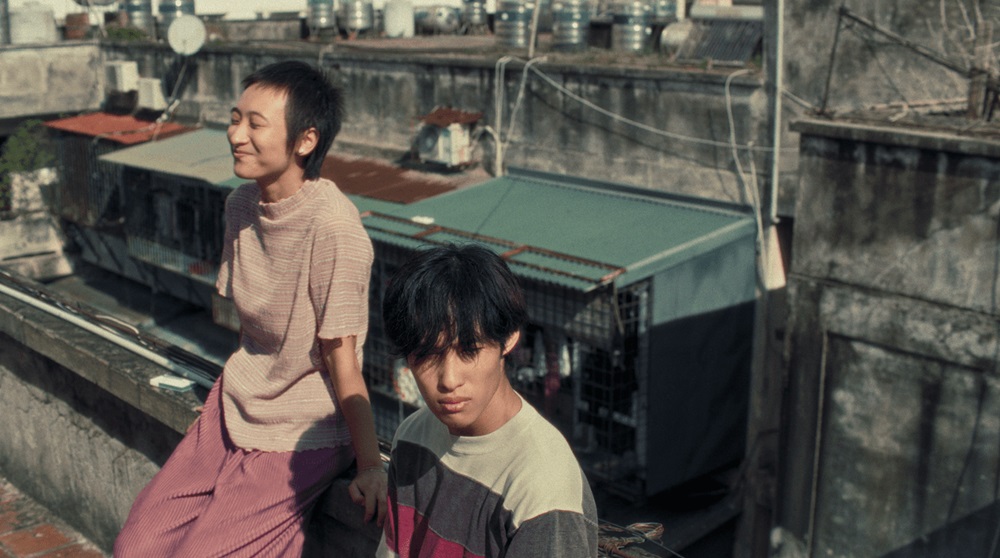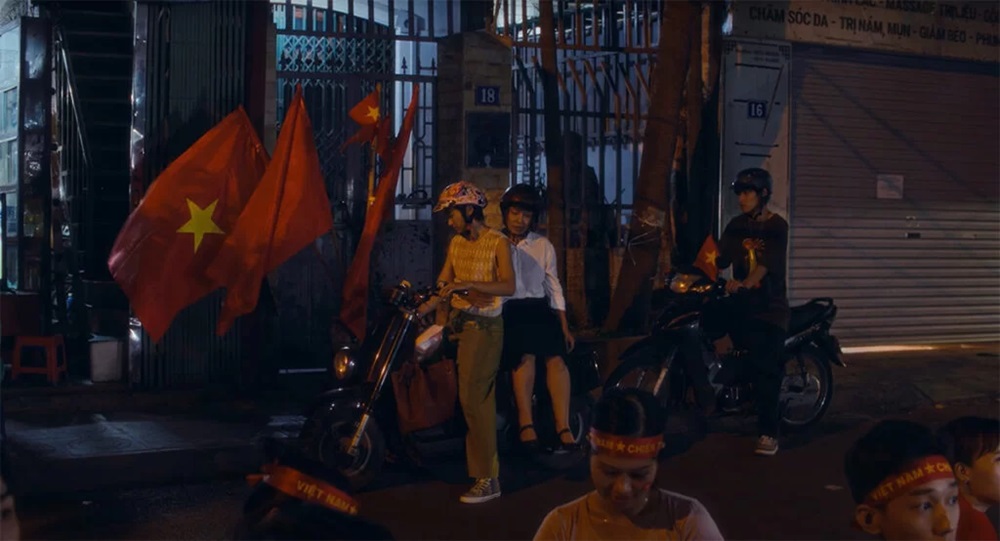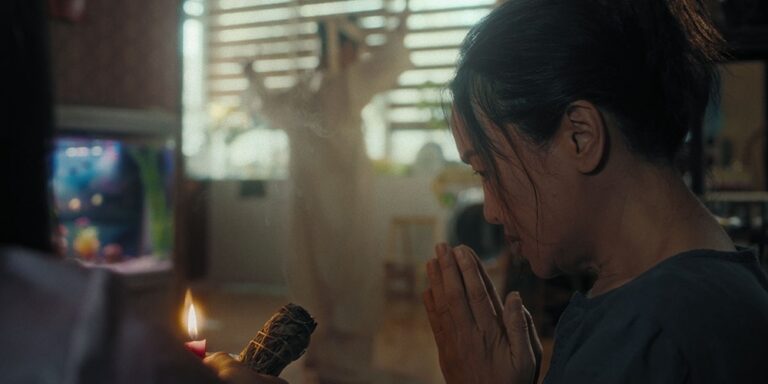That this is Linh’s first feature-length film, and seeing how the story’s rich themes play out, is a testament to what the filmmaker has in store for us next.
More QCinema Coverage: ‘All We Imagine as Light’ Meditating on the Persistence—Despite the Impermanence—of ‘Home’

A Protagonist Caught Between Family and Self
Tam (Tu Oanh) is the typical Asian woman. She manages both her family and work with determination, yet she faces a series of expectations that demand far more from her than they do her husband. Her husband Thanh (Le Vu Long), who moves with a sloth-like indifference, remains nearly silent throughout the film; only speaking one line near the end—a choice made by the actor to amplify his character’s apathy and emotional distance.
On the other hand, Tam’s daughter, Ha (Nguyen Nam Linh), represents a generational shift, caught between her desire for independence and the pressures of familial obligation. In seeking to escape her world, Ha dreams of studying abroad. It’s a prospect that Tam quietly disapproves of. This, even though, like her daughter, she too feels the growing desire to break free from her one-sided marriage.
Tam’s world unravels in the most public and humiliating way when she learns of her husband’s affair—broadcast live on TV for all of Hanoi to witness. It’s a revelation that leaves her shattered and brings shame upon her family. However, rather than offering comfort or support, people around her subtly suggest that the blame lies with Tam herself, implying she should have kept her husband in check. It’s an unfair, painfully familiar accusation that only deepens Tam’s frustration, further pressuring her to “fix” her marriage rather than confront her husband’s betrayal.
Throughout this ordeal, Tam’s husband remains disengaged, spending most of the film in a state that underscores his emotional absence. In contrast, Ha is keenly aware of her mother’s distress, though she channels her own frustration into dreams of studying abroad. Torn between family loyalty and a deep-seated desire for independence, Ha represents the pull of a younger generation eager to step out from under the expectations of tradition.
Layered Symbolism and Cultural Anchors
It’s in this push and pull—between familial duty and individual needs—that Tam’s story unfolds, laying bare the invisible weight of cultural expectations on women, particularly in times of crisis. Tam, faced with community pressures and her own shame, turns to mystical means as a last-ditch attempt to fix her marriage, convinced by others that she must somehow redeem herself and her family through supernatural intervention. In doing so, she reflects the many layers of sacrifice women make to uphold family ideals, often at their own expense.
The symbolisms in “Don’t Cry, Butterfly” reveal themselves gradually, with recurring images that embody Tam’s longing and frustration. A leaking ceiling, which only the women seem to notice, grows into an ominous force, mirroring the burdens weighing on Tam’s family life. Another scene shows Ha and her friend Trong (Bui Thac Phong) accidentally killing a butterfly—a layered moment where Ha reflects on her family’s disappointment over her gender.
Linh carefully uses these symbols to explore the tension between honoring tradition and the invisible, often painful, restraints it places on women. The butterfly, a symbol of freedom and transformation, reflects the freedom both Tam and Ha crave but cannot yet achieve.
As an Asian audience member, I found it easy to recognize the complexities the filmmaker weaves into the story, especially the mix of spirituality and folklore that shapes Tam’s choices. Linh herself has noted that these cultural undercurrents resonate strongly with Asian audiences who “just get it.” In contrast, she acknowledges that Western viewers may feel distanced by the film’s cultural references and reliance on visual metaphor over explicit explanations.

Visual Boldness and Surreal Elements
Visually, “Don’t Cry, Butterfly” is striking, bathing scenes in saturated hues and showcasing unconventional camerawork that adds both depth and whimsy. Ngo Minh Nghia’s cinematography includes shots reflected off unexpected surfaces and complex tracking sequences, subtly enhancing the story’s emotional pull. In addition, Linh’s direction keeps viewers off-balance in moments, like the scene where Tam and Ha feel sorrow upon discovering Thành’s infidelity while a crowd celebrates a national soccer victory around them.
Conversely, the supernatural mass in the ceiling and Tam’s visits to the “Master” blend family drama with mystical overtones, a tonal shift that adds to the film’s offbeat charm but may feel jarring for some. Even so, this surreal side isn’t fully integrated into the story, and the film’s multiple threads, such as Ha’s friendship with Trong, can feel unresolved. While this stylistic choice aligns with Linh’s preference for open-ended storytelling, the lack of cohesion might leave some audiences puzzled.
More QCinema Coverage: ‘Lost Sabungeros’: A Chilling Portrait of Disappearances and Impunity in the Philippines
‘Don’t Cry, Butterfly’: A Debut of Complexity that Shows a Lot of Promise
Finally, one of the film’s great strengths is its cast, especially Tu Oanh’s portrayal of Tam. Her restrained, nuanced performance captures Tam’s quiet resilience and inner conflicts, giving depth to her journey through shame, determination, and self-discovery. Nguyen Nam Linh’s Ha, meanwhile, brings an intense, youthful energy that emphasizes the generational divide between mother and daughter.
It’s an acquired taste, sure. But “Don’t Cry, Butterfly” is an ambitious film, rich with visual symbolism and steeped in cultural context. Director Duong Dieu Linh’s bold mix of genres and themes may be polarizing, especially for audiences unaccustomed to its shifting tones and visual metaphors. However, for those willing to embrace its unique rhythm, the film presents an incisive meditation on family, cultural obligation, and the sacrifices women make to uphold both. It’s a promising, inventive debut that captures a world of unspoken desires—a story of women reaching for freedom in a society that often holds it just out of reach.

A Vietnamese-Philippine-Singaporean-Indonesian international co-production, “Don’t Cry, Butterfly” screened in this year’s QCinema International Film Festival under its Asian Next Wave section. The festival runs from November 8 to 17, 2024. Follow us for more coverage.


